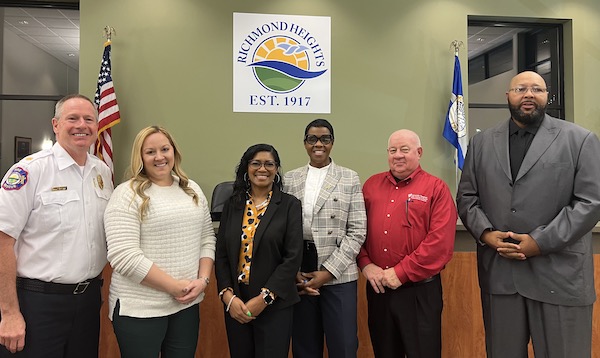University Hospitals and City of Richmond Heights Launch Paramedicine Program
December 14, 2023

Richmond Heights officials pose with UH's Dan Ellenberger (red shirt).
CLEVELAND, Ohio – Residents living in Richmond Heights now have a new resource for staying safe, healthy, and out of the hospital. University Hospitals (UH) and the city recently announced the launch of a Community Paramedicine Program that aims to improve the overall health and well-being of the community by providing skilled healthcare in the home.
Through the paramedicine program, a paramedic working for the Richmond Heights Fire Department will visit residents directly in their homes and provide a wide range of services, including:
- Education about chronic illness
- Assess and increase home safety
- Enhance independence for seniors living in their home
- Connect residents to medical and social services resources
- Identify and close gaps in clinical or social needs
- Post-hospital release follow-up care, including coordinating needed physician and hospital appointments
“University Hospitals has made community health investment a key aspect of our strategic plan, including putting in place programs to promote health equity and keep people healthy at home,” explained Heidi Gartland, Chief Government and Community Relations Officer at University Hospitals. “We have a legacy of caring for our community beyond the walls of our health system, and this program is a perfect example of that commitment in action. By addressing the needs of the Richmond Heights community through the Community Paramedicine Program, we can help residents prevent illnesses and accidents, teach them how to manage complex chronic health conditions and connect them with the necessary resources to improve their overall health outcomes.”
“The community depends on the 911 system, but in some cases, they may not need a trip to the hospital,” stated Marc Neumann, Richmond Heights Fire Chief. “Instead, they may need outreach, fall prevention in the home, and assistance coordinating where to go for their medications or how to administer them. These are more public outreach community paramedicine rather than 911 activities. In general, when we look at the fire service, we like to talk about fire prevention. Fire is probably 12% of what we do. The other 88% is Emergency Medical Services (EMS), so this program is all about EMS prevention – thwarting the incidents before they occur and getting our residents the help they need to be more independent in their homes and the community. It should also help reduce hospital readmissions and costs for our community members.”
At its meeting on December 12, city council passed a resolution authorizing the mayor to enter into a memorandum of understanding with UH for the Community Paramedicine Program. The paramedicine program is made possible by a grant from UH. Through the agreement, UH will provide medical oversight, clinical protocols, and ongoing quality review, as well as a medical director, Dr. Tony Daher, an emergency medicine specialist at UH.
“We are proud to support the rapidly evolving field of Community Paramedicine that is individual-centric to serve our residents best,” said Richmond Heights Mayor Kim A. Thomas. “This proactive health model not only helps residents, but it helps save money and avoids unnecessary strain on our first responders, emergency rooms, and other care partners by alleviating some of those issues by helping people in their homes.”
UH has demonstrated its commitment to the Richmond Heights community through the implementation of this paramedicine program as well as community support sponsored by the UH Richmond Wellness Center that includes biometric screenings, a walking club, health education sessions, and a Q&A with a registered dietitian. Programs like these benefit underserved residents adversely impacted by diseases, health disparities, and socioeconomic barriers to optimal health.
At Tuesday’s meeting, UH also donated items to the city including 100 bicycle helmets and eight automated external defibrillators (AEDs), which can be lifesaving for people experiencing cardiac arrest. “The first link in the chain of survival is access to an AED and citizen CPR. Having people skilled and trained in CPR and how to use this device is the first link in the chain of survival,” noted Fire Chief Neumann.


